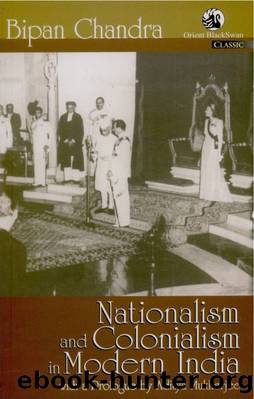Nationalism and Colonialism in Modern India by Bipan Chandra

Author:Bipan Chandra
Language: eng
Format: azw3
Tags: Nationalism and Colonialism in Modern India
Published: 2018-08-26T16:00:00+00:00
3
The new ideological and political approach of Nehruâin particular, its distinct articulation in the Presidential Address at the Lucknow session of the Congressâfrightened the Indian capitalist class. While the dominant and far-sighted pro-Congress leadership of the class set out to take protective measures to contain and confine Nehru, the more conservative and anti-Congress sections decided to launch a frontal attack.
The first shot was fired by A.D. Shroff, Vice-President of the Indian Merchants Chamber of Bombay, on 28th April 1934.88 Three weeks later, on 18th May, 21 leading Bombay businessmen issued what was described by the newspapers as the âBombay Manifesto against Jawaharlal Nehru.â89 A series of individual statements by some of the signatories followedâby A.D. Shroff, again, in the Times of India of 20th May, by Chimanlal Setalvad in the Times of India of 23rd May, by Cowasjee Jehangir in the Times of India of May 29th and by Homi Mody in the Times of India of 11 June 1936. All these statements received full publicity in the Press, and they were often reproduced extensively or in full. The main burden of the critique of the 21 leading businessmen was as follows:
Nehru was spreading the idea that private property was immoral and it did not, therefore, deserve protection by the State. He was thus advocating the âdestructive and subversive programmeâ of doing away with private property and thereby jeopardising ânot only the institution of private property but peaceful observance of religion and even personal safety.â This charge was clearly borne out by his speech at Lucknow, in which he had advocated socialism which had been defined as the ending of private property and the profit system. He had, moreover, illustrated his conception of socialism by describing what was happening in the Soviet Union as the inauguration of âthe new civilizationâ. He had thus argued for âthe total destruction of the existing social and economic structure.â Such ideas were particularly dangerous because âin the present conditions and widespread economic misery of the country, they are likely to find ready, though unthinking receptionâ. The masses were likely to be misled by doctrines leading to âdisorder in course of time.â The capitalists had hitherto played a considerable part in the development of the national movement, but Nehruâs activities were likely to divide the country and so to impede the achievement of self-government.90
The individual critics were worried by Nehruâs abandonment of the contemporary Fabian, Labour-Party, and Social Democratic definitions of âsocialismâ in favour of the clear-cut Marxist definition. As Chimanlal Setalvad put it: âthough he calls his creed socialism, it is really Communism and Bolshevism of the Russian typeâ. Certainly, most people in India, said Chimanlal, would âwelcome socialism, as it is understood and practised in some of the countries in Western Europe.â In fact, many of the critics of Nehruâs propaganda claimed to be supporters of socialism if it meant âthe more equitable distribution of profits between labour and capital, the securing of a reasonable minimum standard of living for all, and even in certain circumstances and conditions the nationalization of some key industries.
Download
This site does not store any files on its server. We only index and link to content provided by other sites. Please contact the content providers to delete copyright contents if any and email us, we'll remove relevant links or contents immediately.
| Anthropology | Archaeology |
| Philosophy | Politics & Government |
| Social Sciences | Sociology |
| Women's Studies |
The Secret History by Donna Tartt(16622)
The Social Justice Warrior Handbook by Lisa De Pasquale(11489)
Thirteen Reasons Why by Jay Asher(7788)
This Is How You Lose Her by Junot Diaz(5771)
Weapons of Math Destruction by Cathy O'Neil(5036)
Zero to One by Peter Thiel(4824)
The Myth of the Strong Leader by Archie Brown(4789)
Promise Me, Dad by Joe Biden(4447)
Beartown by Fredrik Backman(4417)
Stone's Rules by Roger Stone(4415)
How Democracies Die by Steven Levitsky & Daniel Ziblatt(4398)
The Fire Next Time by James Baldwin(4342)
100 Deadly Skills by Clint Emerson(4076)
A Higher Loyalty: Truth, Lies, and Leadership by James Comey(4032)
Rise and Kill First by Ronen Bergman(4012)
The David Icke Guide to the Global Conspiracy (and how to end it) by David Icke(3881)
The Farm by Tom Rob Smith(3872)
Secrecy World by Jake Bernstein(3782)
The Doomsday Machine by Daniel Ellsberg(3730)
